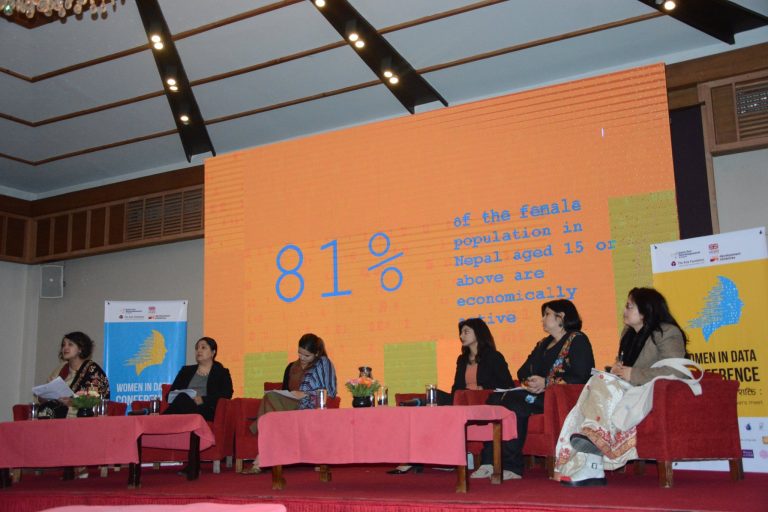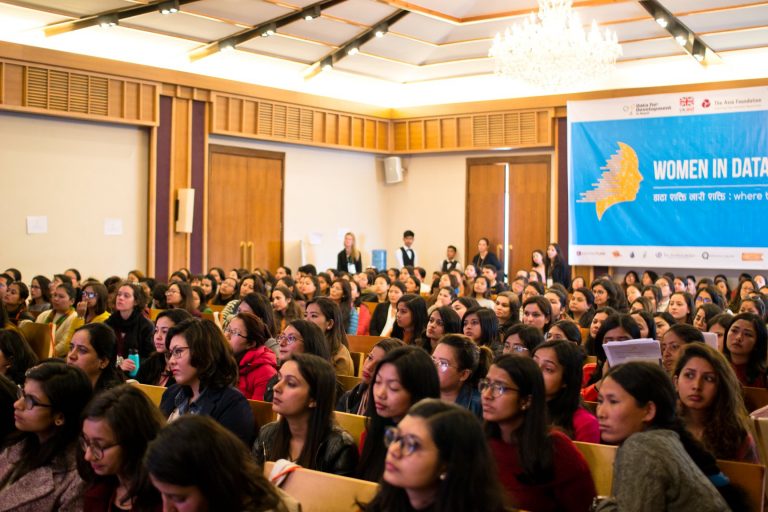This blog was jointly written by Dikpal Khatri Chhetry and Dipti Gautam of Open Knowledge Nepal and has been reposted from the Open Knowledge Nepal blog
On 24th February 2019 Nepal’s first Women in Data Conference was organized with the theme डाटा शक्ति नारी शक्ति – ‘where two superpowers meet’. It brought together inspiring female speakers, influential panelists, data professionals, and aspiring young women in a one-day event to celebrate women working in data. We (Open Knowledge Nepal) were one of the partners of the event.

The program started with the registration and data mart happening in the calm ambience of Hotel Himalaya. We were amazed by the organizing team lineup as the participants comprised of more than 250 females. From registration to photography, everyone was female. It was all well organized and the conference hall quickly filled as the clock turned nine. The emcee, Nikki Sharma, Program Officer (Consultant), Data for Development in Nepal Program formally started the program. Ms. Sharma highlighted the importance of data and the meaningful involvement of women in it.
Ms. Meghan Nalbo, Country Representative, The Asia Foundation gave a keynote speech on “Why Data is the Future and Women should be part of it”. She highlighted the endless possibilities of women coming to the field of pre-dominantly men. She cited how the same data as viewed by a male, can be differently viewed by a female, opening up different avenues. The need to start the conversation about women in data is of paramount importance and this conference has certainly helped in doing so.
After the keynote session, one of the partners of the program, Gauthali Entertainment, presented the video “Move Over: Women Leaders in Data”. The video was produced by all female crew members. It showcased the stories of some of the women leaders in data from Nepal.
Then the panel discussion on “How women are breaking through the glass ceiling by breaking down the numbers” was held. The panelists were Dr. Pranita Upadhyay (Programme Leader, MSc IT and Research Coordinator, The British College), Ms. Jyoti U. Devkota, PhD (Professor of Statistics, School of Science, Kathmandu University), Dr. Sambriddhi Kharel (Sociologist), Dr. Prativa Pandey (Founder and CEO, Catalyst Technology Pvt. Ltd.) and Ms Avasna Pandey (Editorial Page Editor, The Kathmandu Post), which was moderated by Ms Shuvechha Ghimire (Research Manager, Interdisciplinary Analysts).


They shared their journey of being a professional in their respective fields and cited the conscious and unconscious stereotypical behaviors existing in the workplace. They also emphasized when a person put forward their ideas, they should be taken as an idea presented by a professional rather than a woman giving a suggestion. The structural biases have to be confronted and dealt with it creatively.
One of the added elements of the event was that the speakers were given yellow roses, since it signifies a message of appreciation.
A sense of excitement was already in the air, as the session moved forward, the conference hall was filled with the faces of enthusiasts among which almost 95% were female. This female turnout in the event is something that has rarely happened in Nepal.
Shortly, the panel discussion on “Counting women in by making them visible in statistics in Nepal” followed. It was moderated by Ms. Srijana Nepal (Program Officer, The Asia Foundation). The panelists were Ms. Rosy Shakya (Statistics Expert), Ms. Bhumika Shrestha (Transgender Activist), Dr. Meena Acharya (Gender Expert and Economist) and Mr. Bivek Joshi (Monitoring, Evaluation, and Strategic Partnership Officer, UN Women Nepal). They highlighted the need to institutionalize deeper interaction between the users and producers of gender data. There are lots of gaps in the production, use and enabling policy environment for gender data, thus the need to develop its fundamentals from grassroots levels were being emphasized.
Then the interactive presentation on ‘Factfulness and Gender Statistics’ was presented by Ms. Fernanda Drumond, Head of Operations, Gapminder Foundation. It opened up the concept of how data can be used and interpreted to separate the ground reality and assumptions.

 Then, the panel discussion on “When technology, women and data meet” was carried out. The panelists were Ms. Sushma Giri (WLiT), Ms. Binita Shrestha (Women in STEM), Ms. Samita Kapali (Green Growth Group Pvt. Ltd.) and Ms. Sweta Karna (Deerwalk). It was moderated by Ms. Sumana Shrestha. The discussion focused on how social changes have been created through technology. The field of STEM is much more than coding. Policymaking and taking decisions can be better informed through the use of data.
Then, the panel discussion on “When technology, women and data meet” was carried out. The panelists were Ms. Sushma Giri (WLiT), Ms. Binita Shrestha (Women in STEM), Ms. Samita Kapali (Green Growth Group Pvt. Ltd.) and Ms. Sweta Karna (Deerwalk). It was moderated by Ms. Sumana Shrestha. The discussion focused on how social changes have been created through technology. The field of STEM is much more than coding. Policymaking and taking decisions can be better informed through the use of data.
Finally, the announcement of the Open Data Fellowship – Women Edition, by Open Knowledge Nepal (OKN) was made. The representatives from OKN, Mr. Nikesh Balami (CEO) and Ms. Dipti Gautam (Fellowship Lead), described the phases of fellowship and its importance. You can find the details of the fellowship from here: http://fellowship.oknp.org
After the lunch break, the data sessions followed, it included a brief introduction on the different types of workshops that will follow this conference. There were eight such sessions in total, where two sessions took place simultaneously. These included:
- A Soft Skills/Professional Development Session by Ms. Sweta Karna Director of Data Operations, Deerwalk.
- Lightning Talks by Women from the Open Data Community in Nepal.
- Comfortable with Numbers – Statistics by Ms. Rosy Shakya, Statistics Expert.
- How to Prepare Your Paper Using Social Research Methodology by Ms. Shuvechha Ghimire, Interdisciplinary Analysts.
- Data Analysis with SPSS (using PSPP) by Ms. Alina Chhantel, The Open Institute.
- The Basics on How to Use Data Analysis with Excel by Ms. Sunita Shakya, Data for Development in Nepal Program.
- Mapping Gender Statistics Using Open Street Maps by Ms. Sweta Khanal, NAXA.
- Visualizing Gender Data & Statistics by Ms. Anusha Thapa, Ms. Sajani Lama, and Ms. Aarya Bhandari, Bikas Udhyami.
The conference will be followed up by two different phases of training. This type of training will help in preparing the right human resource for working in data.
Key Learnings and Highlights
Key Learnings:
- Data is not always about numbers. It is about the area or subject of interest that it represents.
- Something as simple as keeping a record can make people feel visible, especially in the world where women are shadowed in almost every aspect.
- What we think is mostly clouded by our perception on a topic, but the reality can be surprising at times.
- The percentage of overall data sometimes clouds our judgment, but when we look at the unit values of them, it can be seen to be influenced by certain outliers. Paying close attention to data is necessary.
- Data can be very useful for the common good. Just a simple mark in the map about the availability of public toilets in the area can save us hours of tension. Same goes for petrol stations, clinics, and so on.
Highlights:
- A multidimensional approach to data, inclusive of information of any kind and not restricted to numbers.
- Interactive panel discussions with experts from various sectors discussing their life experiences, data and importance of gender statistics and so on.
- An understanding of the problems and hindrances women working with data face in a workspace.
- A reminder that though news portrays a very discouraging scenario of women, statistics in most cases are in favor of them making progress.
- An insight into the fact that oftentimes, data isn’t accessible at all or if accessible, not available freshly.
- An insight into the contribution women has been making in the data sector be it through research companies and institutions or budding startups.
- A brief outlook on different data related applications like OpenStreetMap and SPSS that were also featured in a detailed training session that followed the conference.
- Lectures from professionals on research essentials, writing CVs, and various related skills.
- Frequent tea breaks and a closing program to facilitate fruitful interactions with experts and fellow participants.
Women in Data Conference and Trainings is organized by Data for Development in Nepal Program with support from various partners.
Open Knowledge Nepal is a non-profit civic tech organisation comprised of openness aficionados. We believe that openness of data is powerful in order to have participatory government with civil society, eventually leading to sustainable development. The organisation has been involved in research, advocacy, training, workshops and developing tools related to open knowledge. We also provide data services and solutions to various agencies and specialised in solving data related problems through consultation and tools development.









